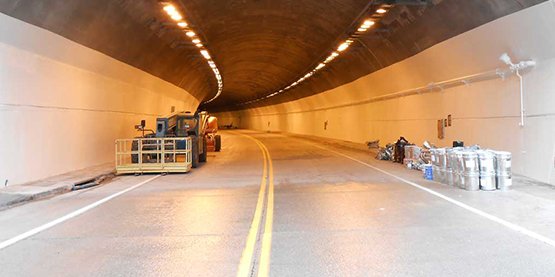Concrete is a mixture of Portland cement, water, and fine and coarse mineral aggregates, and sometimes various admixtures. When all of these materials are mixed in the correct proportions, an complex chemical reaction takes place. This reaction is known as cement hydration, the process by which concrete hardens and cure.
Even though it can be a very strong, hard substrate, bare concrete is also subject to deterioration. Concrete can be very porous, so chemicals can penetrates the pores and attack the paste. The paste and aggregate can also be worn down by physical impact and abrasion. Water can penetrate concrete, freeze and expand inside it when the temperature drops, and ultimately weaken the concrete from within. In addition, if the concrete has reinforcing steel bar (rebar) to impact additional strength and other properties, the rebar can corrode if moisture, oxygen and chloride ions penetrate the concrete. Corrosion or rebar contributes to the deterioration of concrete.

Thus, we coat concrete to protect it from chemical and physical attack. We also it to protect products stored or porcessed in direct contact with the concrete from contamination caused by dust from the substrate. And we coat concrete to improve its appearance, ease of maintenance, and light reflectance. As long as coatings are properly applied to an adequately prepared concrete surface, they can prolong life of the structure.
What makes Concrete difficult to protect ?
Alkalinity
Porosity
Moisture Content
Tensile strength
Laitance
Surface defects
How Coatings protect Concrete
Barrier Protection : The coating prevents moisture and oxygen from reaching the surface.
Inhibition : The coating interferes with the electrochemical process of corrosion.
Sacrificial Action : The zinc pigments in a zinc-rich coating are attacked instead of the steel when corrosion occurs.
Unlike coatings for steel substrates, protective coatings for concrete do not in most cases require or include inhibitive or sacrificial pigments to provide protection. Coatings applied to concrete are typically barrier coatings. They provide protection by becoming a physical barrier, or shield, isolating the concrete from its immediate environment. A barrier coating must prevent aggressive liquids and gases from passing through it and reaching the concrete.
High performance Anti Carbonation Protective / Decorative Coating
Two Component High Solid Food Grade Epoxy Coating
Water Based Protective Cum Anti Carbonation Coating
Silane Siloxane Based Penetrative Primer for Concrete & Masonry Surfaces